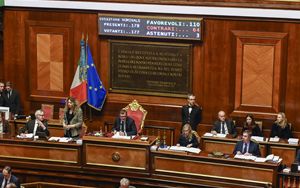(Finance) – With 110 votes in favour, 64 against and 30 abstentions – oppositions against, majority in favor and Action abstained with Maria Stella Gelmini voting in favor in dissent from the group – the Senate today approved the first reading of the Calderoli bill on differentiated autonomy. Provision which now passes to the House for consideration. “The Senate has approved the Autonomy bill: it is an important step towards a more modern and efficient country, respecting the popular will expressed by the vote for the centre-right which had promised it in the electoral programme, by the referendums in Lombardy and Veneto and by the requests of the Emilia-Romagna and other Italian regions. At this moment I feel like addressing a particular thought to Bobo Maroni” commented the Deputy Prime Minister and Minister of Infrastructure and Transport Matteo Salvini. But if the League rejoices from the opposition (and not only) the protest is strong. Before the final vote on autonomy, sheets with the tricolor printed on them from the opposition benches and several senators began singing the Mameli anthem. The Pd and M5s senators sang the first notes, followed by the rest of the opposition and the centre-right.
Purely procedural law to implement the Title V reform, implemented in 2001, the bill on the differentiated autonomy of the regions with ordinary statute in 11 articles it defines the legislative and administrative procedures for the application of the third paragraph of article 116 of the Constitution. It is a matter of defining the agreements between the State and those Regions that ask for differentiated autonomy in 23 subjects indicated in the provision (among these protection of Health, Education, Sport, Environment, Energy, Transport, Culture and Foreign Trade). After the approval of the Senate, the Calderoli bill is ready for reading in Montecitorio with a text modified in the commission and in the Chamber.
The text provides that the requests for autonomy, start on the initiative of the Regions themselves, after consulting the local authorities. Fourteen subjects are defined by Essential Performance Levels (Lep) that is, the criteria that determine the minimum service level that must be guaranteed uniformly throughout the entire national territory. The determination of costs and standard needs, and therefore of the Lep, will take place starting from a survey of the historical expenditure of the State in each Region in the last three years.
The government within 24 months of the entry into force of the bill will have to pass one or more legislative decrees to determine the levels and amounts of the Lep. While Sato and Regions, once started, will have 5 months to reach an agreement. The agreements can last up to 10 years and then be renewed. Or they can end earlier with at least 12 months’ notice.
L’eleventh article, inserted in the commission, in addition to extending the law to the regions with special statute and the autonomous provinces, it contains the safeguard clause for the exercise of the substitute power of the government. The executive can therefore replace the bodies of the regions, metropolitan cities, provinces and municipalities when it is found that the bodies concerned are in breach of international treaties, community legislation or there is a serious danger for public safety and it is necessary to protect the legal or economic unit. In particular, the protection of essential levels of civil and social rights benefits is mentioned.
